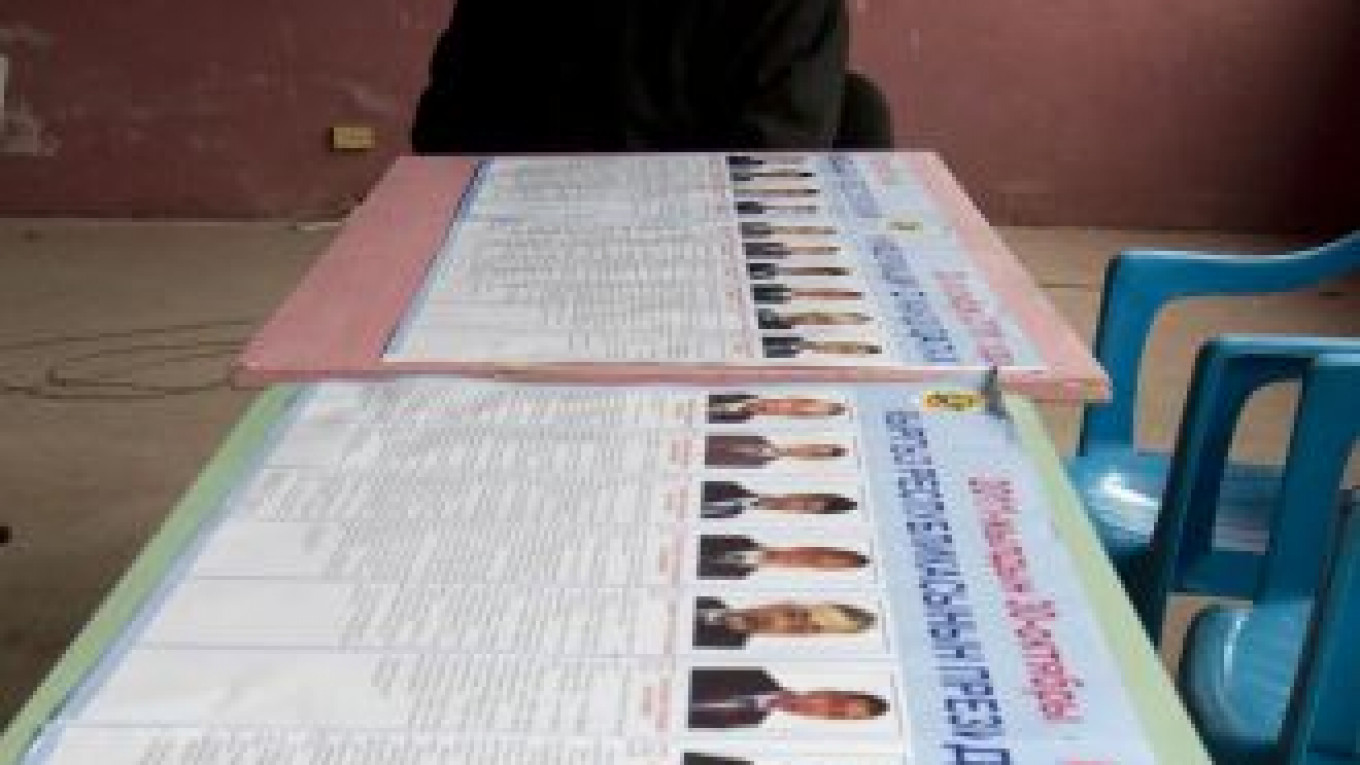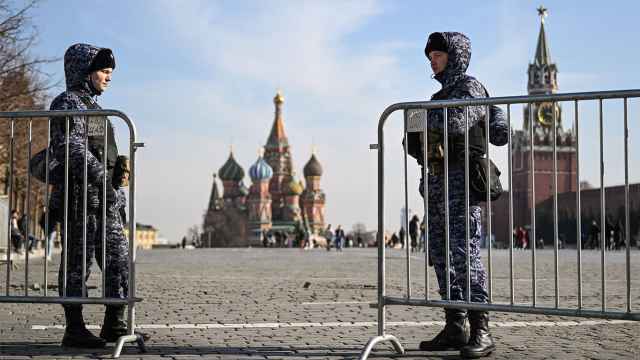TASHLYQ, Kyrgyzstan — Ethnic Uzbeks voting in Kyrgyzstan's presidential election on Sunday backed a candidate with ties to Prime Minister Vladimir Putin as the leader most likely to protect them from renewed violence.
Kyrgyz Prime Minister Almazbek Atambayev, 55, is the clear favorite to become the next president, and his reformist policies are the closest to those of outgoing President Roza Otunbayeva, who will step down at the end of 2011 after watering down the powers of the president and establishing the parliament as the main decision-making body.
"Here in Kyrgyzstan, he is called 'Another Putin,'" said Bakhriniso Rakhmanova, a 58-year-old resident of Tashlyq, a village on the edge of the southern Kyrgyz city of Osh.
Osh was the epicenter of clashes between ethnic Kyrgyz and Uzbeks that killed nearly 500 people in June 2010, three months after the president had been deposed by a popular uprising.
"Atambayev heads the government, and we hope that he will not allow this tragedy to be repeated," Akhmatzhon Kasymov, a 62-year-old ethnic Uzbek, said after voting. His house, big enough to accommodate three families, was burned down in the riots.
Both sides suffered casualties during several days of violence, but ethnic Uzbeks comprise the majority of those prosecuted since. Many complain of daily harassment.
"A young Kyrgyz started on me on the bus only yesterday," said Rakhmanova, a Tajik by ethnicity who has lived among the Uzbek community since childhood. "They said: 'Go back to your Tashkent.'"
Atambayev has visited Putin several times, building close ties with Russia before the election that will test the reforms set in motion after the 2010 revolt to make parliament the main decision-making body.
"A parliamentary system is more suited to the nomadic spirit of the people," Atambayev told reporters after casting his vote Sunday. "After 20 years, we are convinced that we don't need absolute power, which can transform itself into dictatorship."
He has hinted that a U.S. lease on a military air base in the country might not be renewed beyond 2014, a move that would please Moscow, which also has an air base here, and supports the idea of Kyrgyzstan joining the customs union between Russia, Belarus and Kazakhstan.
Kyrgyzstan's government has even named a peak in the Tien Shan mountains after Putin.
Atambayev's main rivals for the presidency, Adakhan Madumarov and Kamchibek Tashiyev, are expected to perform well in the south and have said they will contest the results if they believe violations have taken place.
It was unclear whether Atambayev would secure the outright majority required at the first attempt. If he falls short, he will face a strong challenger from the south in a run-off vote.
"With God's help, I will secure a second round," said Madumarov, a three-time national billiards champion and former deputy prime minister whom many believe presents the greatest challenge to Atambayev.
Madumarov, 46, wants to reverse the constitutional reforms to give equal prominence to the presidency and parliament.
The other leading southern candidate, trained boxer and former emergencies minister Tashiyev, has said "millions" would take to the streets to overthrow the country's leaders if they believed the elections to be unfair.
Although Madumarov and Tashiyev can draw on the Kyrgyz nationalist vote in the south, both candidates strongly reject the nationalist label.
"How can you call me a nationalist?" Tashiyev told a news conference before the election. "My children study in Russia. My wife is Kazakh, and I live among Uzbeks and saved thousands of Uzbek lives," he said, referring to the June 2010 violence.
The next president will be allowed by the current constitution to serve a single six-year term and will appoint the defense minister and national security head.
The field of 16 candidates and the unpredictability of the result mark Kyrgyzstan out in formerly Soviet Central Asia, a region otherwise governed by authoritarian presidents.
"In the context of the region, Kyrgyzstan is different," said Walburga Habsburg Douglas, head of the Organization for Security and Cooperation in Europe's observation mission.
"The people have a genuine choice of candidates, who are presenting different programs," she said.
The views of many voters were simpler.
Bakhodyr, an ethnic Uzbek food technology specialist who works on construction sites, said he had voted for Atambayev because the prime minister had visited Russia and Uzbekistan.
But he said life would never be the same again. "The Kyrgyz insult us daily," he said. "You can't go out after 6 o'clock in the evening. You could be accosted or taken to the police."
A Message from The Moscow Times:
Dear readers,
We are facing unprecedented challenges. Russia's Prosecutor General's Office has designated The Moscow Times as an "undesirable" organization, criminalizing our work and putting our staff at risk of prosecution. This follows our earlier unjust labeling as a "foreign agent."
These actions are direct attempts to silence independent journalism in Russia. The authorities claim our work "discredits the decisions of the Russian leadership." We see things differently: we strive to provide accurate, unbiased reporting on Russia.
We, the journalists of The Moscow Times, refuse to be silenced. But to continue our work, we need your help.
Your support, no matter how small, makes a world of difference. If you can, please support us monthly starting from just $2. It's quick to set up, and every contribution makes a significant impact.
By supporting The Moscow Times, you're defending open, independent journalism in the face of repression. Thank you for standing with us.
Remind me later.






